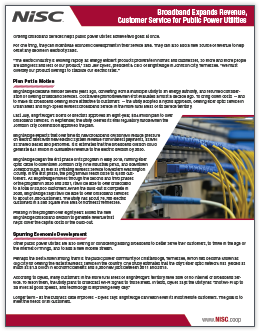 Offering broadband services helps public power utilities achieve two goals at once.
Offering broadband services helps public power utilities achieve two goals at once.
For one thing, they can incentivize economic development in their service area. They can also add a new source of revenue to help offset any decline in electricity sales.
“The electric industry is evolving rapidly as energy efficient products proliferate in homes and businesses, so more and more people are using less and less of our product,” said Jeff Dykes, president & CEO of BrightRidge in Johnson City, Tennessee. “We must diversify our product offerings to stabilize our electric rates.”
Plan Put in Motion
BrightRidge became nimbler several years ago, converting from a municipal utility to an energy authority, and resumed consideration of offering broadband services. Costs were prohibitive when first evaluated almost a decade ago. To bring down costs — and to make its broadband offering more attractive to customers — the utility adopted a hybrid approach, offering fiber optic service in urban areas and high-speed wireless broadband service in the more rural areas of its service territory.
Last July, BrightRidge’s board of directors approved an eight-year, $64 million plan to offer broadband services. In September, the utility cleared its final regulatory hurdle when the Johnson City Commission approved the plan.
BrightRidge expects that over time its new broadband division will reduce pressure on electric rates with new electric system revenue from interest payments, as well as shared leases and personnel. It is estimated that the broadband division could generate $41 million in cumulative revenue to the electric division by 2030.
BrightRidge began the first phase of its program in early 2019, running fiber optic cable to downtown Johnson City, nine industrial parks, and downtown Jonesborough, as well as initiating wireless service to western Washington County. In the first phase, the program will reach close to 8,500 customers. As BrightRidge moves through the second and third phases of the program in 2020 and 2021, it will be able to offer broadband to a total of 32,000 customers. When the build-out is complete in 2026, BrightRidge says it will be able to offer broadband services to about 61,000 customers. The utility has about 78,700 electric customers in a 350 square mile area of northeast Tennessee.
Phasing in the program over eight years allows the new BrightRidge broadband division to generate revenue that helps cover the capital costs of the build-out.
Spurring Economic Development
Other public power utilities are also offering or considering adding broadband to better serve their customers, to thrive in the age of the Internet of Things, and to add a new income stream.
Perhaps the best known among them is the public power community of Chattanooga, Tennessee, which has become known as Gig City for offering the fastest wireless service in the country. One study estimates that the city’s fiber optic network has yielded as much as $1.3 billion in economic benefits and 5,200 new jobs between 2011 and 2015.
According to Dykes, many customers in the more rural areas of BrightRidge’s territory have slow or no internet or broadband service. To reach them, the utility plans to broadcast Wi-Fi signals to those areas. In tests, Dykes says the utility has “shot Wi-Fi up to six miles at good speeds, and technology is improving every day.”
Longer term – as the business case improves – Dykes says BrightRidge can reach even its most remote customers. The goal is to meet the needs of all customers.
“It’s a great way to provide an incentive for economic development,” Dykes said. “For example, Wi-Fi would enable more and more people to work from home. And students can do homework and research with internet access at home.”
Dykes is excited about the new service. “We won’t stop at 80%. We want to serve 100%” of our customers,” he said. But he is also realistic about the prospects. It is a new type of business for the utility, and BrightRidge faces competition from incumbent providers with years of experience in a competitive field.
NISC Eases Market Entry
A significant number of BrightRidge’s customers already have some sort of broadband access through the local telephone provider or through a cable provider such as Comcast and Charter Communications. But usually the speeds are slower, and according to Dykes, surveys have shown that customers have a strong desire for another option.
If nothing else, BrightRidge’s entry into the market will introduce competition. “If that results in customers getting more competitive pricing, that’s a good thing,” Dykes said. “And if levels of service improve, then we have had a positive impact.”
Dykes knows that broadband is a totally different marketplace. “We’ve got to learn how to compete for business. We have provided great electric service for years. Now we want to provide that same great service in the broadband space.”
The transition is easier as BrightRidge is able to leverage its existing software platform. The utility has used National Information Solutions Cooperative (NISC) for its billing and accounting software since 2009. Recognizing the shift in the market, NISC combined their decades of experience in the telecom industry into their utility software. iVUE Connect™ leverages NISC’s existing utility-based Customer Care & Billing solutions that today, effectively manages electric, water, gas and more traditional utility services, to also now include management and provisioning of broadband and cable solutions, all on a single platform.
The result is a powerful product that BrightRidge uses to manage customer requests, seamlessly provision broadband and cable services, while also leveraging existing integrated solutions like mapping, to meet the utility’s expanding service needs.
Dykes is quick to point out that customers will not jeopardize their electric service if they do not pay their broadband bill, as the electric and broadband services are run as separate businesses.
“NISC allows us to cover every aspect of our business on one system,” Dykes said. “Whether it is an engineer or a service rep, they are all looking at the same system. NISC has made the whole process very smooth.”
BrightRidge will also offer other fiber-backed services in addition to internet; including phone, streaming film, and TV content that it can provide to its growing base of broadband customers. Dykes says, “The question is, what do we want to look like as a utility? What we looked like 20 or 30 years ago is not what we will look like 10 years from now.”
This sponsored advertising feature was published Aug. 19, 2019, by the American Public Power Association.
